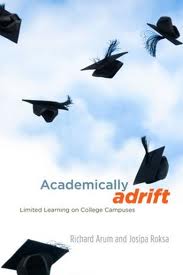 College tuition rates are soaring. More and more students go to college every year, and a bachelor’s degree is now required for entry into a growing number of professions. After all the efforts invested by parents and high school seniors to find the “perfect” college and after the tens of thousands of dollars invested in attending that college, are undergraduates really learning anything at all? For a large proportion of students, Richard Arum and Josipa Roksa’s answer to that question is a definitive “no.”
College tuition rates are soaring. More and more students go to college every year, and a bachelor’s degree is now required for entry into a growing number of professions. After all the efforts invested by parents and high school seniors to find the “perfect” college and after the tens of thousands of dollars invested in attending that college, are undergraduates really learning anything at all? For a large proportion of students, Richard Arum and Josipa Roksa’s answer to that question is a definitive “no.”
In their new book, Academically Adrift (University of Chicago Press), considered by some the most important book on higher education in a decade, Arum and Roksa raise serious questions about the quality of the academic and social experiences of college students.
The authors analyzed the survey responses, transcript data, and results of the standardized Collegiate Learning Assessment, designed to measure gains in critical thinking, analytic reasoning, writing and other “higher level” skills taught at college. This test was administered to more than 2,300 undergraduates at 24 institutions, in their first semester and then again at the end of their second year. Their findings were not encouraging:
- 45 percent of students did not demonstrate any significant improvement in learning during the first two years of college;
- 36 percent of students “did not demonstrate any significant improvement in learning” over four years of college.
- Those students who did show improvements tended to show only modest ones.
The authors point to a serious lack of rigor in college education; minimal classwork expectations and a series of distractions place learning close to the bottom of the students’ list of priorities:
- 32 percent of students each semester do not take any courses with more than 40 pages of reading assigned a week;
- 50% don’t take a single course in which they must write more than 20 pages over the course of a semester;
- Students spend, on average, only about 12-14 hours a week studying, and that much of this time is studying in groups.
Noting that many ungraduates are “drifting through college without a clear sense of purpose,” Arum and Roksa argue for greater academic rigor, and more consistency across disciplines in the rigor of requirements. “It’s a question of what outcome you want,” Arum said. “If the outcome is student retention and student satisfaction, then engagement is a great strategy. If, however, you want to improve learning and enhance the academic substance of what you are up to, it is not necessarily a good strategy.”
The book is creating a buzz: The Social Science Research Council in Washington recently hosted a panel featuring experts on assessment and higher education, with representatives from leading think tanks and foundations. And the book was recently discussed at the meeting of the Association of American Colleges and Universities.
* * *
Parents, too, might do some thinking around some of the issues raised by this book. Some questions that come to mind:
- Is your child ready for college?
- What criteria are informing your choices of a college?
- What are your expectations of your child once s/he becomes an undergraduate?
- Have those expectations been discussed?
- Are there ways to help your child “own” and value the privilege of attending college in a more serious way – perhaps by requiring of him/her a few hours of weekly paid or volunteer work?